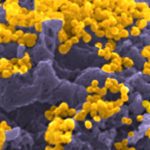Lien vers Pubmed [PMID] – 15869862
J. Autoimmun. 2005 Jun;24(4):319-28
Epidemiological studies performed in different ethnic populations and family studies, notably based on a partial phenotype of the autoimmune process, indicate that genetic factors are involved in the occurrence of pemphigus. However, the precise heritability remains uncertain in the absence of twin concordance rate studies. Among the different strategies available to identify genetic factors participating in autoimmune disease susceptibility, only population studies based on case-control design have been performed in pemphigus. These studies consistently showed that MHC locus, in particular HLA class II alleles, are associated with pemphigus vulgaris and pemphigus foliaceus. Other genes of the MHC locus may also participate in disease susceptibility as shown by studies using microsatellite markers across different regions of the MHC. It is likely that other non-MHC genes are involved in the pathogenesis of pemphigus. In particular, involvement of a polymorphic variant of desmoglein 1 gene was shown to be associated with pemphigus foliaceus and to interact in an epistatic manner with MHC class II genes to contribute to the autoimmune process. Other candidate genes to which a role can be assigned in the disease pathogenesis should be considered to design case-control or family-based association studies. Genome scan studies which require a large number of multiplex families to reach statistical power, should also be considered in the endemic form of pemphigus foliaceus because of the high number of familial cases.

